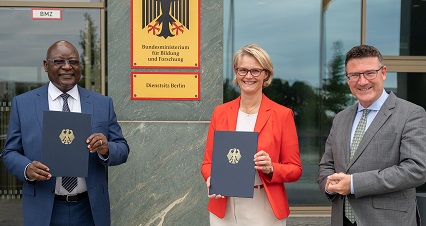
Energy Ministry launches new funding window for rural electrification

The Ministry of Mines and Energy this week launched the Green People’s Energy Project, which aims to contribute to universal and sustainable energy access and strengthen the renewable energy sector with a focus on promoting off-grid electrification, in rural areas.
The Green People’s Energy new funding window, targets low-income individuals, rural micro-
enterprises and business owners that range from retail shops, bakeries, tailors, carpentry and farmers such as poultry, crop farming and other farming activities.
Launched under the Solar Revolving Fund of the ministry, the project is jointly run by Germany through the GIZ ministry of mines and energy. The GIZ has provided financial assistance to the tune of EUR330,000 to the Solar Revolving Fund for the New Funding Window.
The Solar Revolving Fund is a credit facility that aims to stimulate demand for the deployment of renewable energy technologies in off-grid areas, especially for communities living in rural areas, but also for urban clients.
“During Harambee Prosperity Plan 2, the government and the ministry in particular aim to electrify about 6,000 rural and 13,000 peri-urban households. Therefore, this project aims to contribute towards achieving the energy goal of secure and cost-effective energy supply,” mines and energy Deputy Minister, Kornelia Shilunga said.
According to Namibia household national data, there are 235,884 rural households, of which 35,855 households are connected to the grid, while 18,324 rural households have access to solar energy, giving a rural electrification rate estimation of 20%.
Furthermore, the statistics show that over 80% of rural households, use wood for cooking, and over 50% of rural households use battery lamps, torches, or cellphones for lighting, with 10% using candles. Households with access to renewable energy for cooking are less than 2% and about 7% for lighting.
Shilunga noted that low-income individuals will be financed at maximum funding of up to N$20,000 interest-free while farmers will be financed at a maximum funding limit of N$60,000 and Traders at N$95,000 with 4% interest charges per year.











































